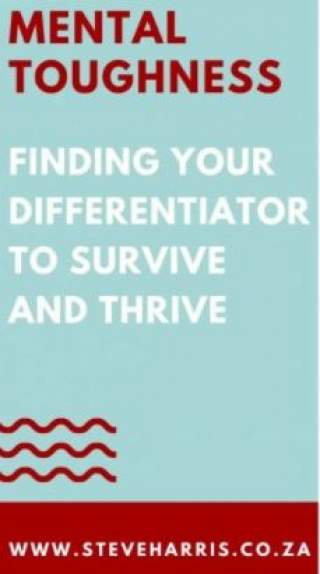Mental Toughness - Your Mind is Your Greatest Asset
The trick or secret to increasing mental toughness is that there is neither trick nor secret. Dr Steve Harris, the Mind Doctor and motivational speaker, has a healthy skepticism for anything claiming a secret. Quick fixes and oversimplified solutions to achieving success or significance insult our intelligence. Instead, he favours a planned approach by systematically practicing and scaffolding the seven mental toughness components. He firmly believes that our most tremendous potential lies in our minds and is our ultimate asset.
When we improve our mental toughness, we move away from irrational fears, illogical beliefs, destructive addictions, superstitions, and other forms of self-destruction. With mental toughness, you can consistently give your best performance, regardless of what is going on within or around you. In this way, you can become the best possible version of yourself.
A Definition of Mental Toughness
The definition of mental toughness goes beyond the limiting description of a killer instinct or a high pain and panic threshold. Dr Steve defines it as the ability to prepare for consistent performance by managing your mind so that it is not distracted and directing your energy to the right place, at the right time, for the right reason. “Strong minds suffer without complaining; weak minds complain without suffering.” - Lettie Cowman.
Signs That you are Mentally Tough
- You simultaneously have ‘fire in the belly and ice in the brain.
- You develop a self-authoring mind that balances your socially conditioned mind.
- You adapt and improve each mental toughness component by 1%.
- Your concentration is fuelled by passion leading to conditional optimism.
- Your composure transcends volatility, uncertainty, complexity, and ambiguity.
- You apply controlled aggression through increasing energy, intensity, and willpower.
- You express confidence through supreme self-belief without arrogance.
- You take calculated risks using curiosity with the courage to innovate and improvise.
- You pursue competence and wisdom through learning, unlearning, and relearning.
- You display commitment; neither trapped in gritting nor quitting – you reinvent.
- Your mental toughness mantra is "I have the capacity to absorb pain and loss, and move on.
“The resilient brain can withstand ongoing trauma, think differently, stave off brain-related illnesses including depression, and retain cognitive memory for peak performance.” (“Keep Sharp: How to Build a Better Brain at Any Age – Sanjay Gupta 2021)
Motivational Course For Corporates
Dr Steve offers a motivational course for organisational groups during these tough business conditions, which consists of ten forty-five minute modules, blending skills associated with motivation to help you discover marginal gains in your performance. These include topics such as;
- Going from fragile to agile by identifying and magnifying previously hidden personal differentiators. This enables you to accelerate ahead of current problems into a future where you are more competitive and fulfilled.
- Improving your mental and physical abilities through the application of critical thinking, holistic wellness, fostering teamwork, managing conflict and aligning your culture with the organisational culture.
- Creating new competitive advantages that help manage struggles as well as set new benchmarks through the seven components of mental toughness (concentration, composure, controlled aggression, confidence, calculated risks, competence and commitment)
Dr Steve has helped many organisations develop competitive strategic differentiators along the lines of leadership, change management, teamwork, sales, service, and wellness. Each of these is enhanced by having staff who become mentally tougher.
Contact Dr Steve Harris to find out more about his Motivational and Team Building Courses.
Does Talent Equate to a Competitive Advantage?
Dr Steve Harris, The Mind Doctor and motivational speaker in South Africa, recalls being told that no matter how hard you practice and strive for excellence; you can never achieve the same levels of mental or physical prowess as talented leaders, elite athletes, and high achievers. His research shows that this claim is false.
Steve agrees that some people certainly have a greater inclination for sports or certain leadership positions. For example, you are unlikely to become an international Lock Forward in rugby unless you are tall, and preferably taller than two metres.
However, everyone can acquire skills that enable them to improve their performance and excel within the realms of their boundaries – you need to learn how to become the best version of yourself. When you start out on this journey, the first thing you need to realise is that it is both mental and physical attributes that allow you to get ahead of the pack. Essentially, you have to be mentally tough and resilient in today’s fast-paced and stress-induced world.
Mental Toughness Requires a Holistic Approach
The ideal approach to developing mental toughness is a holistic methodology. You cannot gain a sustainable competitive advantage by simply concentrating on one angle. The key is to set an objective and be mentally tough enough to follow through with it. There must be an alignment between what you say and what you do to accomplish and develop a competitive advantage.
Nature and Nurture
Some people are born with or develop substantial physical or technical abilities that help them become successful. These abilities are enhanced when supported by mental toughness. Talent, combined with mental toughness is a powerful combination. Mental toughness is a resource that can and must be developed.
With increased mental toughness, those with a small amount of talent can become the best version of themselves and prevail over those with some talent, but no mental strength. However, mental toughness is not a solution on its own.
How Much Success can be Attributed to Mental Toughness?
Professor Ross Tucker talked about the relative mental and physical contributions needed to succeed. He concluded that there is no exact figure on how much each grants you. He said, “Some say it is 50% mental and 50% physical to 100% mental and 100% physical, but it depends on the context.”
In the above example, he was referring to sport. “Canoeing is different from athletics; long jump differs from high jump, both of which vary from a marathon. Downhill skiing, no doubt, requires substantial parts of both mental and physical application……, it’s difficult to pin down.” (Tucker, 2013).
Improve Your Inner Game
Playing the outer game of golf requires knowledge of the sport and its mechanical skills. To improve the outer game, you need to increase your game expertise and develop mechanical skills through learning and experience. However, your inner game exists beyond the knowledge and logistics of the game. Understanding and developing this intrinsic resource has a huge influence on your performance. Great golfers understand that the outer game can only take them so far; to get further, they need to improve their inner game because this understanding will ultimately enable them to improve performance over time.
In a last word about talent, Marianne Adams gave a TED talk, where the gist of her conversation was “Talent doesn’t mean anything if you are a jerk.” This requires no further explanation!
Dr Steve Harris has been studying performance for thirty years, of which fifteen have been devoted to performance improvement through an integrated mind and body approach. His MBA dissertation at the University of Cape Town focused on business performance improvement. He followed this with a PhD thesis on Mental Toughness as a factor in performance.
Academic research combined with experiences assisting business organizations and sport teams at all levels led to his work as a motivational speaker, workshop facilitator, conference speaker and keynote speaker. Steve is now also offering leadership courses. Steve has the business knowledge and skills to view a wide range of problems with a perspective broader than the established patterns that entrench thinking and close minds.
To hire Steve as a motivational speaker, facilitator or for successful team building programmes, This email address is being protected from spambots. You need JavaScript enabled to view it..
Mental Toughness - Finding Your Differentiator To Survive And Thrive
Dr Steve Harris’ (The Mind Doctor) research and personal experiences have led him to believe that the evolution from surviving to thriving is achieved through incremental, smart, and primarily proactive adaptations that provide humans with marginal yet significant gains.
He asks you now to consider whether you are adapting so that you can progress from surviving to thriving? If you feel that you are already thriving, his question then is, “What are you doing to accelerate even further ahead?”
As a World Champion Sportsperson, Award-Winning Entrepreneur, Motivational Speaker, and armed with his PhD on Mental Toughness, Dr Steve Harris acknowledges that people struggling with harsh conditions, or persons with mental health concerns that draw them outside consensus reality, will struggle to adopt his ideas on thriving.
Steve says that to thrive, you need differentiators that make you stand out from the rest of the crowd. These differentiators must be something different and unique that set you apart from others pursuing similar outcomes so that you will have a distinct competitive advantage.
This type of advantage is usually admired by others unless you are signalling superiority, and in so doing, you are “othering”. Othering means that you are trying to establish that others are inferior to you.
For some, a stand-out competitive advantage may be highly stressful and therefore undesirable. This phenomenon is called FOSO – the Fear Of Standing Out. For them to benefit from standing out, they need to develop specific skills to manage the stress and possible resentment that could accompany this sometimes-lonely place. As is commonly said, “The tallest trees catch the most wind.”
The human polar bear, Lewis Pugh, created a unique competitive advantage. Lewis stood out for the right reasons when he created a unique competitive advantage. He achieved success through enduring extreme cold-water conditions and continued by achieving significance when he combined this ability with a passion for environmental sustainability.
Steve met Lewis when, as a junior, he joined the Clifton Surf Lifesaving Club in Cape Town. He was highly driven and hungry for personal accomplishment. Lewis trained hard and showed extraordinary willingness to go the extra mile. However, no amount of training would be enough to make Lewis a serious contender for top honours in the swimming aspects of competitive surf lifesaving. Top competitors were usually of Olympic standard. This did not deter Lewis, who continued to train more than most and helped to teach others.
An offshoot of his preparedness to train hard was his acceptance of the icy Atlantic sea temperatures off Clifton beach. His peer group lauded and respected him for this trait. Steve suspects that this acknowledgement and recognition motivated Lewis to use his adaptiveness to icy water as a differentiator. Eventually, it led him to international fame as an environmentalist and earned him the nickname ‘human polar bear’.
We all know how challenging life has been with the Covid pandemic – both for individuals and businesses. Finding your differentiator is not an easy task, but it will give you or your business a competitive advantage that may just help you survive these times.
Steve’s motivational speaking offering is unique in that he has various motivational topics to choose from to suit your company and help you achieve your objectives. These topics are tailor-made and suited to match your requirements, use a holistic approach and produce remarkable results!
Contact Steve to schedule some time with him.




